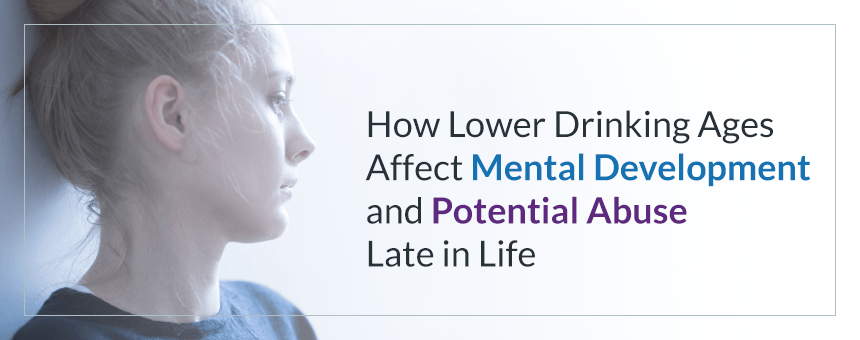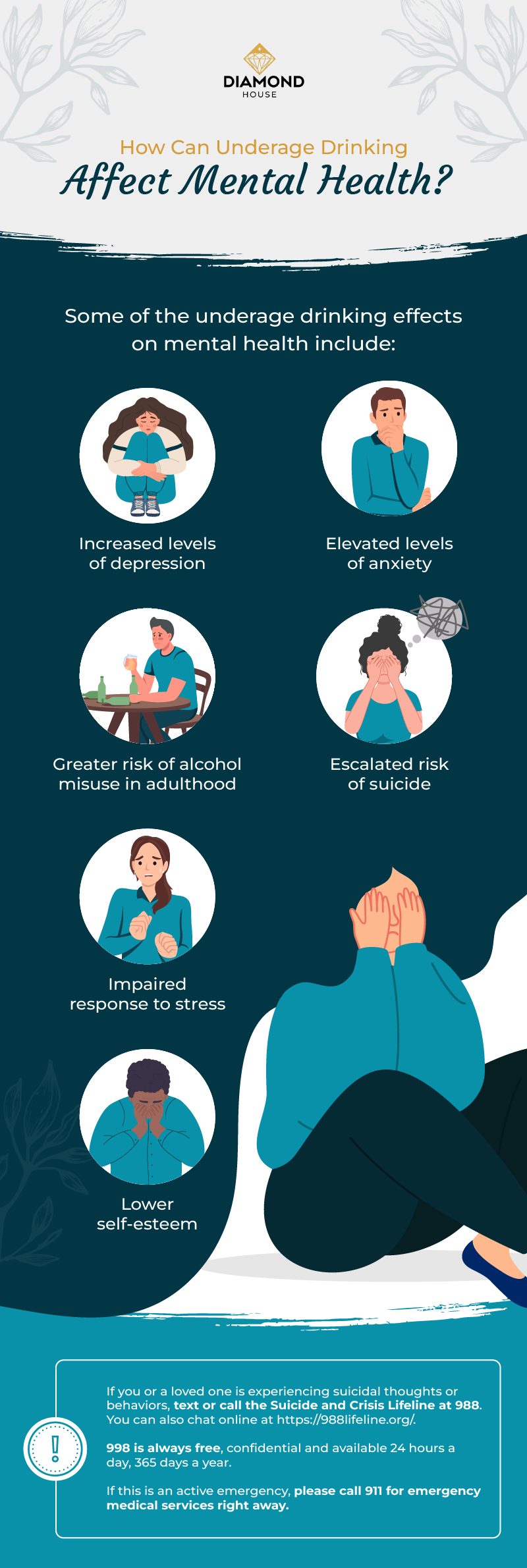
If you or a loved one is experiencing suicidal thoughts or behaviors, text or call the Suicide and Crisis Lifeline at 988. You can also chat online at https://988lifeline.org/. 998 is always free, confidential and available 24 hours a day, 365 days a year.
If this is an active emergency, please call 911 for emergency medical services right away.
Underage alcohol consumption is a significant health problem in the U.S. A Youth Risk Behavior Survey found that 23% of high school students drank alcohol within 30 days of the questionnaire. The same survey also found that 11% of teens binge drink, 5% drove under the influence of alcohol and 14% rode with a driver who had been drinking.
A lower drinking age and mental health are connected. School-aged children go through a critical period of emotional and physical growth. If teens drink during these vital developmental phases, their mental health, brains and bodies are at risk of detrimental and even deadly consequences. The consequences impact individuals into adulthood.
Each year, there are over 4,000 alcohol-related deaths among underage drinkers, and almost 150,000 underage drinkers land in emergency rooms. In addition, every year, there are approximately 300 teens who die due to alcohol-related suicides.
Over 90% of underage drinking is classified as binge drinking, which can lead to alcohol poisoning, lowered inhibitions and increased high-risk behaviors.
Even if underaged individuals don't experience immediate effects from misusing alcohol, they can negatively impact their mental development and increase their likelihood of using substances later in life.
Teenage drinking isn't just harmless fun. It is essential to understand the risks to protect teens during a critical physical and mental development phase of their lives.
An adult brain only matures by age 25. That means that alcohol has a significant impact on teen brains versus adults. Alcohol represses and slows the function of a teen's central nervous system. Consequently, youth who drink alcohol are more likely to experience:
Alcohol rewires the brain and places individuals at higher risks of developing long-term cognitive impairments, affecting speech patterns, memory, movement and reasoning.
Tests show that adults who started drinking when they were adolescents have issues with simple activities like assembling projects or reading a map. Beyond the physical impact, underage drinking can cause mental illness.

The mental effects of underage drinking are pretty extensive. Adolescent drinking can cause the blocking and damage of the development of healthy mental pathways.
Some of the underage drinking effects on mental health include:
Adolescents may use alcohol to self-medicate symptoms of anxiety, depression and other mental health problems. Still, relief is temporary, and the substance worsens conditions. Teens who abuse alcohol are also prone to mental health problems, like psychosis and depression, as adults.
Lower-age drinking leads to other adverse outcomes that may impact individuals into adulthood. Consequences of underage drinking include:
There are several additional consequences of underage drinking:
Lower-age drinking is associated with alcohol misuse at later stages of life. The earlier an adolescent starts drinking, the greater the chance they are to misuse alcohol and other substances during adulthood. Research shows that adults at the age of 26 and older who started drinking by the age of 15 are 3.5 times more likely to develop alcohol use disorder (AUD) than their counterparts who waited until age 21 to start drinking.
Besides the disposition of developing substance use disorders, underage drinking can lead to memory loss, learning issues and impaired brain functionality in adulthood. Research shows that teenagers who misuse alcohol show poorer health and greater dissatisfaction decades later.
Underage drinking is detrimental for various reasons. It negatively impacts mental health and brain development during crucial stages of life and increases the likelihood of addiction use disorders later in life.
Consuming alcohol responsibly as an adult may not put you at significant risk of severe health complications, as is the case in adolescents. Still, knowing when it is time to seek help is vital.
If you or an adult loved one has developed a substance use disorder from drinking alcohol during developmental years, know it's not too late to receive help.
Diamond House Detox offers professional, holistic and medically assisted treatments near Sacramento in Northern California. The detox process can be dangerous to do on your own. That's why we recommend professional assistance and monitoring in a clinical space. We will help you manage the withdrawal symptoms, prevent health complications during detox and start to address future abstinence.
We offer individualized care and dual treatments to address any underlying mental health issues. Each individual is unique, and so is the detox process. Our compassionate and qualified staff are with you every step of the way, helping you treat alcohol or substance use disorders while staying in private, luxurious rooms. While you are being treated, we provide group and individual therapy, delicious meals from our personal chef and on-site support.
A healthy solution to address your alcohol misuse disorder is a phone call away. Take the first step on your sobriety journey and call the Diamond House Detox admissions team at 800-205-6107. Alternatively, fill in an online contact form, and we'll be in touch.